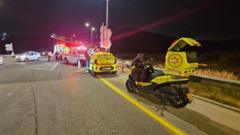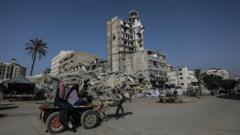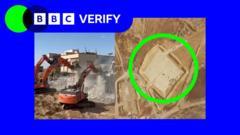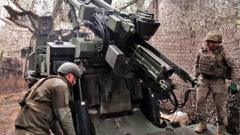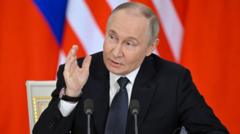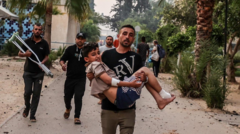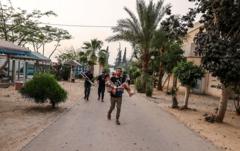The ongoing Israeli military operations in Gaza have resulted in at least 80 fatalities following overnight airstrikes, raising international concerns over the humanitarian situation. Both sides continue their narrative on the conflict while calls for intervention intensify.
Death Toll Rises to 80 as Israeli Strikes Hit Gaza
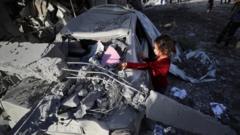
Death Toll Rises to 80 as Israeli Strikes Hit Gaza
Recent Israeli airstrikes in Gaza have led to a surge in casualties, with hospitals reporting significant numbers including women and children among the dead.
At least 80 individuals have lost their lives due to Israeli airstrikes across Gaza, as reported by hospitals and first responders. The Indonesian hospital confirmed that 22 children and 15 women were among those who perished when multiple residences in the northern Jabalia region were targeted overnight. The al-Awda hospital nearby reported the arrival of additional casualties, with 9 more dead, including 7 children.
The Israeli military justified the strikes by stating they targeted militants from Hamas and Palestinian Islamic Jihad located in the north, having previously advised residents of Jabalia to evacuate following rocket launches into Israel. In the meantime, UN humanitarian chief Tom Fletcher urged the UN Security Council to take immediate actions to avert what he termed a "genocide" in Gaza, accusing Israel of imposing cruel conditions on civilians.
Fletcher's call drew sharp rebuttal from Israel’s UN envoy, Danny Danon, who labeled the allegations as unfounded, asserting that humanitarian aid systems were being manipulated to assist Hamas instead.
Eyewitnesses in Jabalia described multiple explosions during the night, with activists sharing videos of the aftermath, displaying flames illuminating the skies. Survivors like Hadi Moqbel recounted the devastating impact, revealing that several family members, including a two-month-old infant, were among the casualties.
The al-Awda hospital director reported an overwhelming influx of 52 injured victims, struggling to provide care amid critical shortages of medical supplies and fuel to operate generators, leading to closures of certain departments. The Hamas-run Civil Defence agency affirmed the total death toll of 80 from the strikes across Gaza, predominantly in the northern territories.
The Israeli military reiterated its operations were aimed at Hamas and Islamic Jihad members, contending various measures were taken to minimize civilian casualties. On Tuesday night, the military had issued a "last warning" for Jabalia residents to evacuate ahead of anticipated attacks.
As both sides dig in, activists and humanitarian workers continue to highlight the dire circumstances faced by the displaced populations across Gaza. The UN has reported a massive displacement of nearly 20% of Gaza's 2.1 million inhabitants, with 70% now constrained by military "no-go" zones or subject to evacuation orders. The humanitarian crisis is exacerbated by severe food shortages, with many community kitchens shutting down, leaving many residents to grapple with acute food insecurity.
Internationally, Palestinians look towards recent developments, including Hamas’s release of a prisoner they designated as a goodwill gesture, hoping these might pave the way for renewed dialogues and potential ceasefire agreements.
Israeli Prime Minister Benjamin Netanyahu has stated intentions to escalate military actions against Hamas, dismissing suggestions of halting operations while maintaining that a temporary ceasefire may occur but will not impair Israel's ultimate goal to dismantle Hamas.
The humanitarian situation continues to invoke concern, with calls for action from global leaders as casualties mount.
The Israeli military justified the strikes by stating they targeted militants from Hamas and Palestinian Islamic Jihad located in the north, having previously advised residents of Jabalia to evacuate following rocket launches into Israel. In the meantime, UN humanitarian chief Tom Fletcher urged the UN Security Council to take immediate actions to avert what he termed a "genocide" in Gaza, accusing Israel of imposing cruel conditions on civilians.
Fletcher's call drew sharp rebuttal from Israel’s UN envoy, Danny Danon, who labeled the allegations as unfounded, asserting that humanitarian aid systems were being manipulated to assist Hamas instead.
Eyewitnesses in Jabalia described multiple explosions during the night, with activists sharing videos of the aftermath, displaying flames illuminating the skies. Survivors like Hadi Moqbel recounted the devastating impact, revealing that several family members, including a two-month-old infant, were among the casualties.
The al-Awda hospital director reported an overwhelming influx of 52 injured victims, struggling to provide care amid critical shortages of medical supplies and fuel to operate generators, leading to closures of certain departments. The Hamas-run Civil Defence agency affirmed the total death toll of 80 from the strikes across Gaza, predominantly in the northern territories.
The Israeli military reiterated its operations were aimed at Hamas and Islamic Jihad members, contending various measures were taken to minimize civilian casualties. On Tuesday night, the military had issued a "last warning" for Jabalia residents to evacuate ahead of anticipated attacks.
As both sides dig in, activists and humanitarian workers continue to highlight the dire circumstances faced by the displaced populations across Gaza. The UN has reported a massive displacement of nearly 20% of Gaza's 2.1 million inhabitants, with 70% now constrained by military "no-go" zones or subject to evacuation orders. The humanitarian crisis is exacerbated by severe food shortages, with many community kitchens shutting down, leaving many residents to grapple with acute food insecurity.
Internationally, Palestinians look towards recent developments, including Hamas’s release of a prisoner they designated as a goodwill gesture, hoping these might pave the way for renewed dialogues and potential ceasefire agreements.
Israeli Prime Minister Benjamin Netanyahu has stated intentions to escalate military actions against Hamas, dismissing suggestions of halting operations while maintaining that a temporary ceasefire may occur but will not impair Israel's ultimate goal to dismantle Hamas.
The humanitarian situation continues to invoke concern, with calls for action from global leaders as casualties mount.

